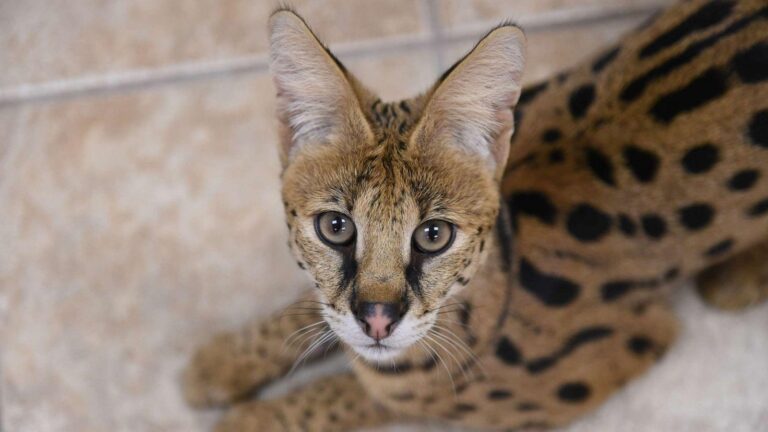Spanish Authorities Take Action Against Illegal Exotic Cat Breeding
In a shocking turn of events that has reverberated through animal welfare circles, law enforcement in Spain has apprehended a couple accused of unlawfully breeding and trafficking exotic felines under deplorable conditions. This operation, which allegedly involved the sale of rare and endangered species, raises alarming questions about wildlife conservation efforts and the illegal animal trade within the region. The incident underscores the persistent challenges faced by both law enforcement agencies and animal rights activists in their fight against the unlawful exploitation of endangered species. As investigations progress, this case may shed light on the intricate legal protections surrounding exotic animals in Spain and beyond.
Law Enforcement Action Against Illegal Exotic Cat Breeding
Spanish authorities have launched a significant crackdown on a couple suspected of managing an illicit breeding operation for exotic cats. This initiative was triggered by ongoing inquiries into illegal wildlife trafficking, which poses serious threats to biodiversity as well as public safety. The couple was discovered with various species, including servals and Bengal cats, which they reportedly marketed online without obtaining necessary permits. Their activities not only contravened Spanish laws but also raised grave concerns regarding animal welfare due to many cats being kept in unsanitary environments.
Officials described this operation as part of a larger strategy aimed at combating illegal wildlife trade across Europe. Along with making arrests, authorities confiscated several cats from the couple’s premises. Initial evaluations indicated that numerous animals had suffered from neglect and poor living conditions. This crackdown emphasizes an urgent need for more stringent regulations and enforcement measures to safeguard endangered species while preventing their exploitation for profit. Efforts are currently underway to rehabilitate these rescued felines and secure suitable placements within accredited facilities.
Ethical and Legal Dimensions of Wild Animal Breeding
The recent detainment of a couple in Spain for breeding exotic cats has sparked vital discussions about both ethical considerations and legal frameworks related to wild animal breeding practices. The individuals operated an unlicensed business that not only breached local wildlife protection statutes but also raised significant concerns regarding animal welfare standards. This situation highlights ongoing debates surrounding the morality associated with owning exotic pets as well as breeders’ responsibilities toward ensuring these animals’ health and wellbeing. Key ethical issues include:
- Animal Welfare: Profit motives frequently enough overshadow considerations for animals’ health or psychological needs during breeding processes.
- Conservation Impact: Breeding wild creatures can detract from conservation initiatives aimed at preserving their natural ecosystems.
- Public Safety Risks: Improperly managed exotic animals can pose dangers if they escape or are mishandled around humans.
The legal landscape governing wild animal breeding is tightly regulated across many nations due to its importance in balancing human interests with ecological preservation efforts. In Spain specifically, this couple’s actions were blatant violations against laws designed to protect biodiversity while ensuring responsible management practices concerning wildlife. key legal aspects include:
| Certain Legal Considerations | Description |
|---|---|
| Pertinent Licensing Requirements | Breachers must acquire permits demonstrating compliance with established wildlife protection regulations. |
| An Evolving Animal Rights Framework | Legal systems increasingly acknowledge animals’ rights influencing contemporary breeding methodologies . |
| Trade Regulations | International agreements govern endangered species commerce aiming at curbing trafficking activities. |
Enhancing Animal Conservation Laws: Strategies for Wildlife Protection
The recent arrest involving illegal activities related to exotic cat breeding necessitates revisiting current conservation legislation while considering potential enhancements.Strengthening existing laws will be crucialin safeguarding wildlife against exploitation alongside bolstering initiatives aimed at protecting threatened species.key recommendations include:
- Heightened Penalties:Increasing penalties imposed on individuals engaging in unlawful breeding or trafficking could act as effective deterrents .
- More Stringent Licensing protocols:Implementing rigorous licensing requirements will help mitigate illicit operations among breeders/sellers dealing with exotics .
- Improved Monitoring Systems:Augmenting surveillance over online platforms where such transactions frequently occur would enable authorities better identification/shutdowns targeting criminal enterprises .
Additionally , international collaboration remains essential when addressing cross-border issues tied directly into globalized nature surrounding illicit trades involving fauna . By fostering partnerships between nations , law enforcement entities can exchange intelligence leading towards successful interventions dismantling traffickers networks effectively . Initiatives worth considering might encompass :
- Create Joint Task Forces:</strong Establish multinational task forces pooling resources/expertise focused solely upon tackling crimes linked directly back towards poaching/trafficking operations ;
- < Strong Public Awareness Campaigns : launch educational outreach programs raising consciousness around ramifications stemming from engaging illegally trading practices impacting overall biodiversity levels ;
- <Strong Funding Allocations For Conservation Projects :</Strong Increase financial backing directed towards supporting endeavors combating habitat degradation whilst reinforcing legislative structures protecting vulnerable populations ;
- More Stringent Licensing protocols:Implementing rigorous licensing requirements will help mitigate illicit operations among breeders/sellers dealing with exotics .
Conclusion: Essential Insights moving Forward
The apprehension of this couple involved in illegal feline trading has illuminated pressing concerns regarding wildlife trafficking along with black market dealings concerning rare creatures worldwide.Authorities emphasize prioritizing protective measures geared toward safeguarding endangered populations while ensuring strict adherence enforced throughout relevant legislation governing such matters.This case serves not just highlight persistent obstacles encountered when confronting unlawful trades but also reinforces our collective responsibility toward preserving natural ecosystems.As investigations unfold further attention shifts now onto guaranteeing appropriate sanctuaries exist where seized specimens may thrive safely away from harm’s reach whilst holding accountable those implicated fully under applicable laws.The implications extend far beyond Spanish borders echoing urgent calls necessitating collaborative efforts globally dedicated towards conserving imperiled life forms everywhere.




